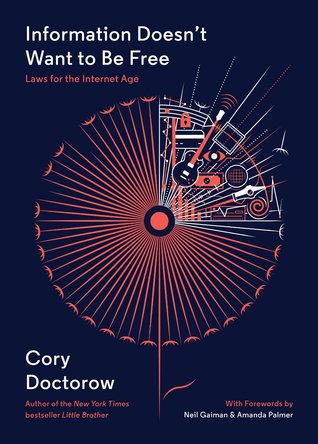More on this book
Community
Kindle Notes & Highlights
Read between
December 18 - December 22, 2014
People actually like supporting the artists whose work they like. It makes them feel happy. You don’t have to force them. And if you force them, they don’t feel as good.
In street terms: locking up Internet content is the equivalent of issuing mandatory ball gags for street musicians, to be worn until an interested passerby brokers a deal with a middleman who has a permit to remove the ball gag and release the musician for a few minutes, long enough to let them play a song, after which point the hands are tied up again and the ball gag goes back into the mouth.
“Never underestimate the determination of a kid who is cash-poor and time-rich.”
“Nothing needs to be done to keep honest people honest, just as nothing needs to be done to keep tall people tall.”
The copyright debate is filled with lies, damned lies, and piracy statistics.
In many cases, the majors now take huge income guarantees, or even equity, from the streaming services—money that covers their artist-royalty obligations and then some, leaving them with massive profits they’re under no obligation to share with their musicians, and often don’t. Merlin, a nonprofit rights agency that arranges deals with streaming services for many independent labels, found that the income guarantee offered to them by one streaming service amounted to six times what they would ultimately have earned through royalties alone.
this is practically the Internet’s origin story: the U.S. government created a military and scientific network for information sharing, and its users promptly started a Star Trek discussion forum. Tim Berners-Lee created the World Wide Web for sharing high-energy physics papers, and its users promptly started posting pictures of their cats, their failed cake-baking adventures, and the titanic snowfall that had just been dumped outside their lab windows. And then they, too, started arguing about Star Trek.
At its heart, net neutrality is the idea that ISPs should deliver the bits we ask for as quickly as they can get them. ISPs, on the other hand, are petitioning for the right to give favorable treatment to some kinds of Internet data. For example, if YouTube bribes your ISP for “fast lane” access to its customers, you’ll have great, speedy access to YouTube—and all its competition will be jittery and sucky. ISPs say that anyone who objects to this arrangement wants something for nothing. Why should YouTube’s competitors have the same access to AT&T’s subscribers if YouTube is willing to pay
...more
Under SOPA and PIPA rules, any site that hosts a link to another site that links to infringing content would be a party to that infringement. That means that if, say, Facebook published a user’s link to a website that itself contained links to infringing content, Facebook could be sued.
“On the one hand, information wants to be expensive, because it’s so valuable. The right information in the right place just changes your life. On the other hand, information wants to be free, because the cost of getting it out is getting lower and lower all the time. So you have these two fighting against each other.”
As a system of regulation for the entertainment industry, individual copyright laws can be good or bad. I like the part of copyright that says my publisher can’t print this book without getting my permission, because I won’t give them that permission unless they pay me. I don’t like the part of copyright that says that I, the author, can’t authorize you to break digital locks that are put on my works by an intermediary. But disagreeing with some rules doesn’t mean you disagree with rules altogether. Wanting a different copyright isn’t the same as not wanting copyright at all.
in January 2012, a thoroughly documented Computer and Communications Industry Association study called “The Sky Is Rising” found that more creators are creating more media, and that larger audiences are spending more money, than ever before. There’s now more music, more movies, more video, and more books being created than at any other time in history, and they’re bringing in a larger pool of money than ever.
during the U.S. debate on SOPA and PIPA, the Motion Picture Association of America circulated a report written by the Information Technology and Innovation Foundation, a rightsholder-dominated think tank, that argued that the censorship measures in SOPA and PIPA would probably work, because they were the same measures already in use in China, Iran, the UAE, Armenia, Ethiopia, Saudi Arabia, Yemen, Bahrain, Burma, Syria, Turkmenistan, Uzbekistan, and Vietnam.
SECURITY IS a process, not a product”—is
In 2009, Amazon announced a new feature for the Kindle. It could now use a text-to-speech program to read its customers’ e-books aloud in a sort of robotic monotone. This was and is pretty cool. But some publishers objected, claiming that this was tantamount to making an unauthorized audiobook. This is a weird theory of copyright—a bit like saying that allowing users to change the font in the book is the same as making an unauthorized large-print edition.
“Every pirate wants to be an admiral.”
The big six are rightly proud of their maverick history. They agree, it seems, that “one” isn’t the right answer to “How many companies should be in charge of the movie business?” Apparently, though, they think the right answer is “six.”
It’s not enough for creators and their industry to love free speech. We have to learn to share it, too.
when you’re in the business of solving problems for a living, your job becomes making sure that the problems never go away, or you’ll be out of business.


